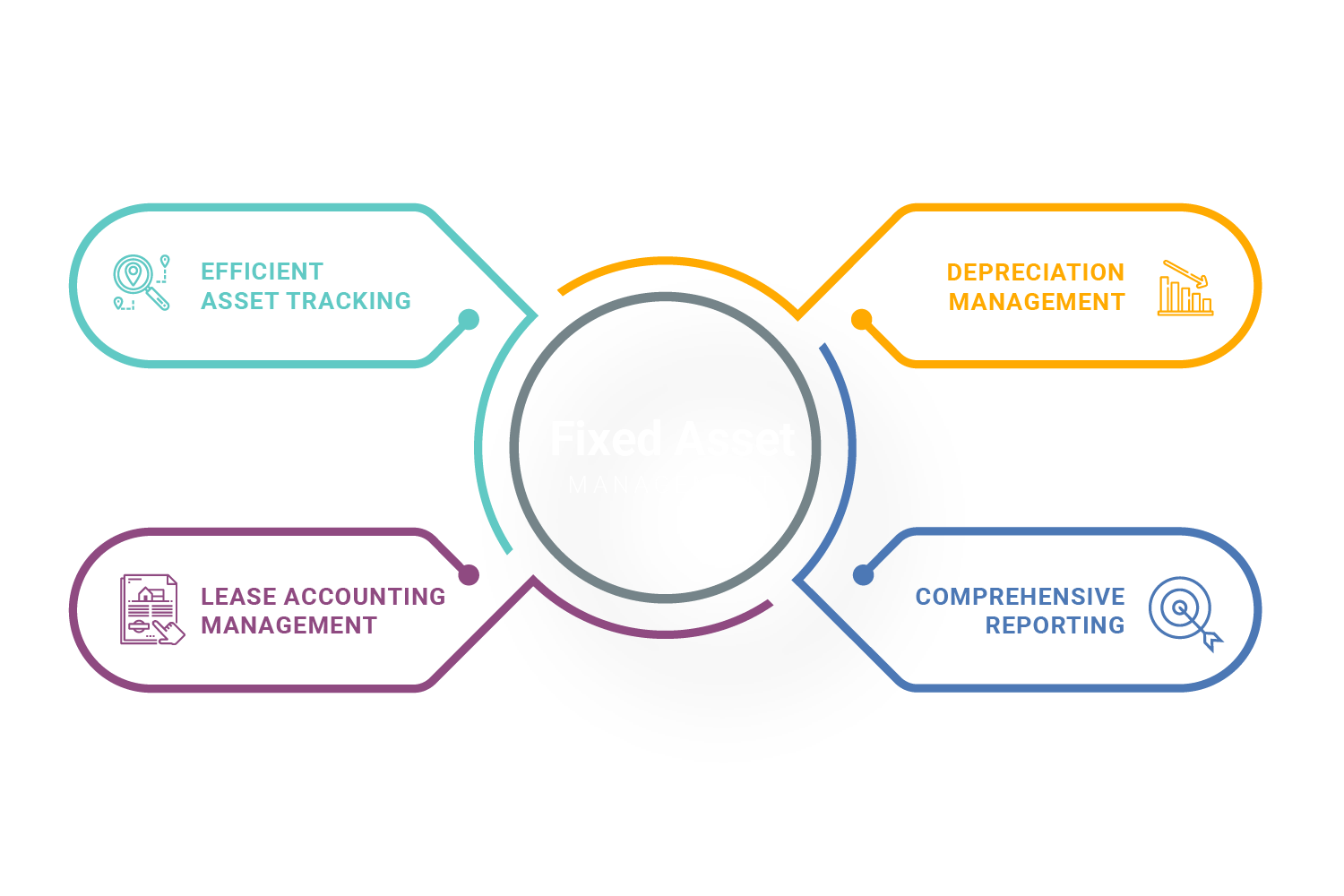Why Efficient Fixed Assets Management is Essential for Business Success with NetSuite?


NetSuite Fixed Assets Management:
NetSuite ERP module for Fixed Assets Management enhances financial reporting accuracy and timeliness by automating depreciation calculations and lease accounting. It simplifies asset management by creating a detailed inventory of assets, including acquisition costs, service start dates, estimated lifespans, and more. Additionally, it tracks lease agreement specifics such as contract value, duration, and discount rate. This comprehensive solution streamlines the entire asset lifecycle, from acquisition to retirement, eliminating the need for cumbersome spreadsheets and manual processes.
Boosted Efficiency
Enhance productivity by eliminating the need for spreadsheets, manual data entry, and redundant efforts. NetSuite ERP automates depreciation and lease accounting tasks, reducing errors and expediting closing.
Enhanced Record Accuracy
Keeping records up-to-date is crucial to avoid overvaluing fixed assets and unnecessary insurance costs. Fixed Assets Management simplifies the process of maintaining precise records for both depreciating and non-depreciating assets.
Managing Fixed Assets, the Hard Way
The traditional approach to asset management involves laborious and error-prone processes centered around spreadsheet usage. Collecting and inputting data into spreadsheets is time-consuming and highly susceptible to inaccuracies. Often, this process requires information retrieval from various departments or facilities, leading to multiple versions of the same spreadsheet being circulated among different individuals, further amplifying the risk of errors.
In cases involving multiple contributors, the likelihood of data being entered incorrectly, depreciation methods being inconsistently applied, or formulas being misused or altered increases significantly. The absence of version control and audit trails makes tracking who made what changes challenging, rendering such information virtually unattainable. This, in turn, can lead to higher auditing costs as more time is spent scrutinizing the data.
Since this process operates external to the accounting system, depreciation expenses must be manually entered, compounding issues related to data integrity. Every instance of data transfer from one system to another introduces the potential for additional errors, even if the data is moved through export/import procedures or system integrations. The reliance on manual data entry further exacerbates these challenges, making the entire process even more cumbersome and error-prone.
Key Features of NetSuite Fixed Assets Management
NetSuite’s ERP encompasses the complete asset lifecycle, from procurement to disposal, supporting organizations in keeping their records current, precisely tracking depreciation information, and adhering to lease accounting regulations. This solution seamlessly integrates with NetSuite Procurement and Advanced Financial Management, automating the creation of new assets and posting depreciation and lease expenses.
- Efficient Asset Tracking
Effortlessly generate a precise inventory of depreciable and non-depreciable fixed assets and uphold comprehensive records throughout their entire lifecycle. Efficiently allocate and monitor assets based on region, facility, department, or other reporting criteria. Seamlessly transfer assets from one subsidiary or business unit to another, preserving complete historical data without manual data entry.
- Depreciation Management
NetSuite Fixed Assets Management automates the computation of depreciation costs, allowing for the use of standard or customized methods and schedules. Finance teams have the flexibility to determine how and when depreciation is applied. For instance, NetSuite ERP offers the option for more precise control with usage-based approaches, such as not depreciating assets during seasonal downtimes when equipment is offline.
- Lease Accounting Management
NetSuite Fixed Assets Management streamlines lease accounting processes and guarantees adherence to financial reporting standards. It captures critical lease information, such as commencement and termination dates, total expenses, and discount rates, and evenly distributes lease costs throughout the agreement’s duration. NetSuite also automates the creation of distinct journal entries for lease and interest expenses while continuously updating the remaining lease liability.
- Comprehensive Reporting
Generate precise financial statements that align with tax and accounting regulations. Create standard fixed-asset reports or harness the power of SuiteAnalytics to dissect asset data based on various criteria, such as location, subsidiary, or other relevant factors.
Benefits of NetSuite Fixed Assets Management
- Depreciation Flexibility:
Utilize pre-designed templates or create customized depreciation scenarios with user-defined schedules.
- Streamlined Compliance:
Automate lease payments, expense amortization, and reporting to simplify adherence to lease accounting standards.
- Cost Savings:
Identify and eliminate “ghost assets” expenses, ensuring that equipment no longer used doesn’t incur unnecessary costs.
- In-depth reporting:
Access detailed analyses of costs, depreciation, lease expenses, and associated data across various operational domains.
Challenges Addressed by NetSuite Fixed Assets Management
- Streamlining Processes:
NetSuite’s automated fixed-assets management solution simplifies operations, boosting the productivity of finance teams.
- Ensuring Data Accuracy:
Track fixed assets comprehensively, from acquisition to disposal, and access real-time data for more precise reporting.
- Consistent Depreciation:
Ensure uniform application of depreciation rules, schedules, and models for all assets, eliminating inconsistencies.
- Simplifying Lease Accounting:
Automate lease data capture, expense amortization, and liability tracking to simplify lease accounting complexities.
- Expedited Closures:
Automatically post depreciation and lease expenses to the general ledger, saving time and reducing the risk of data-entry errors.
Understanding NetSuite Fixed Assets Management Pricing
Businesses of all sizes, from budding start-ups to rapidly expanding enterprises, have adopted NetSuite ERP to enhance their operations. If you’re considering this solution for your business, you might be curious about the associated NetSuite costs.
NetSuite operates on a subscription basis, entailing an annual license fee. This license comprises three primary components: the core platform, optional modules, and the number of users. Additionally, there is an initial one-time implementation fee for setting up the system. The flexibility of cloud software allows you to effortlessly activate new modules and incorporate more users as your business scales. So, when exploring NetSuite pricing, consider these factors to tailor the solution to your evolving needs.
Come say "Hi"
Partner with ERP Buddies, aN ERP Solution Provider
ERP Buddies is a Global ERP Solution Provider with diverse experience in implementing and Supporting NetSuite ERP for many industries.
With operations in the North America, Europe, Asia and United Kingdom, our Expert Team is accessible globally. It is their priority to create a smooth and positive experience for clients. Our experts assist clients throughout the entire implementation process, with on-site support and consultation and additional assistance in customizing your system to guarantee it meets your business needs. For our contact info, click below, and personnel for review will be in touch.
We can’t wait to get in touch with you!












